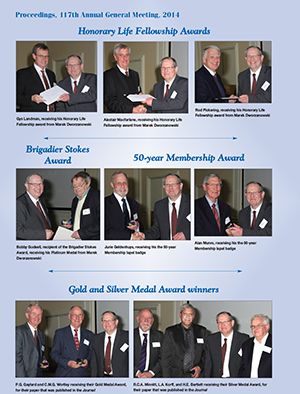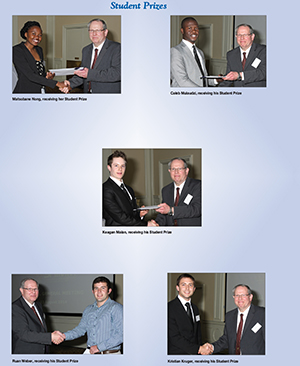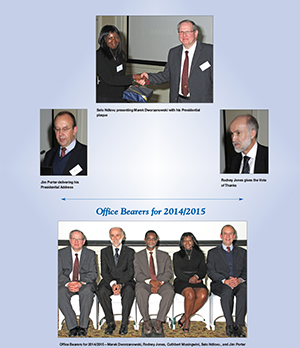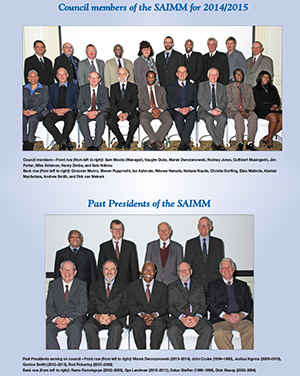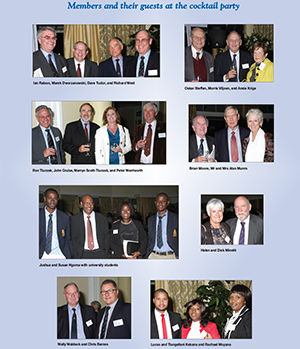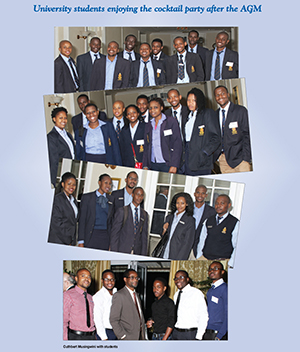Services on Demand
Article
Indicators
Related links
-
 Cited by Google
Cited by Google -
 Similars in Google
Similars in Google
Share
Journal of the Southern African Institute of Mining and Metallurgy
On-line version ISSN 2411-9717
Print version ISSN 2225-6253
J. S. Afr. Inst. Min. Metall. vol.114 n.9 Johannesburg Sep. 2014
Proceedings, 117th Annual General Meeting, 2014
The 117th Annual General Meeting of The Southern African Institute of Mining and Metallurgy was held at The Country Club, Johannesburg, Napier Road, Auckland Park on Wednesday, 13 August 2014.
Welcome
The President, Marek Dworzanowski, extended a special welcome to the guests and representatives of our sister institutes and other associations, and also to recipients of awards, senior members of industry, Honorary Life Fellows, past-Presidents, our members, and other guests, among them the following:
Association of Mine Managers, Andy Brown, President Engineering Council of South Africa, Edgar Sabela, Acting CEO
Geological Society of South Africa, Avinash Bisnath, President
Institute of Mine Surveyors of South Africa, Nape Mojapelo, President
Mine Metallurgical Managers Association of South
Africa, Buang Moloto, President
Mine Ventilation Society of South Africa, Vijay
Nundlall, President
South African Colliery Managers Association,
Ranganai Chinamatira, President
South African Institute of Electrical Engineers, Pat
Naidoo, President
Past-Presidents attending
John Cruise
Rams Ramokgopa
Gys Landman
Gordon Smith
Joshua Ngoma
Dick Stacey
Rod Pickering
Oskar Steffen
Minutes
The minutes of the previous Annual General Meeting, which were published in the September 2013 issue of the Journal, and sent to all members, were confirmed.
Obituaries
The President announced the deaths, during the year, of the following members:
Honorary Life Fellow
D.G. Krige
Fellows
D.J. Arnold, J. L. Taylor
Retired Fellows
P.E. Bryant, J.F. Dear, M.A. Madeyski, E. Pinkney, H. Scott-Russell, A. Veress
Members
J.G. Murgatroyd, M. Greyling, E. Gwarisa
Retired Members
H.F. Bartels, M.J. Deats
Associate
I.J. Theron
Retired Associate
G.D. Louw
In memory of the deceased and in sympathy with the bereaved, all rose and observed a moment of silence.
Honorary Fellowship
Selo Ndlovu: Honorary Life Fellowship is awarded by the Council to corporate members of the Institute who have rendered outstanding service to the Institute over many years. It is my pleasure to announce that the Council has decided to award Honorary Fellowship to:
> Gys Landman, for his outstanding leadership of the SAIMM during his term of office in 2010/2011. Dr Landman as continued his support of the SAIMM and was instrumental in setting up the mentorship programme of the SAIMM.
> AlastairMacfarlane, for his outstanding contribution on the technical programme committees, organizing committees for conferences and his contribution in the rewriting of the SAMVAL Code, which is the South African Code for the reporting of mineral asset valuation. Mr Macfarlane is currently the Chairman of the SAMVAL working group and the Chairman of IMVAL, the international committee for the reporting of minerals asset valuation.
> Rod Pickering, for his outstanding leadership of the SAIMM during his term of office in 2007/2008. Mr Pickering was instrumental in changing the membership database and the current SAIMM offices. He was also involved in the technical programme committee and served on a number of organizing committees. He still assists with the refereeing of technical papers for the Journal
Brigadier Stokes Memorial Award
Selo Ndlovu: The Brigadier Stokes Memorial Award was instituted in 1980 to commemorate the outstanding contribution to the South African mining industry made by Brigadier R.S.G. Stokes, an Honorary Life Fellow and past-President of this Institute. This is the premier award of the Southern African Institute of Mining and Metallurgy and is made to an individual for the very highest achievement in the South African mining and metallurgical industry. It gives me great pleasure to announce that the award for 2014 is to be made to Bobby Godsell.
Selo Ndlovu called upon Jim Porter, to read the citation: It is my great pleasure and honour to present this citation to a man who, apart from acting as CEO of world's second-largest gold mining company, has worked tirelessly to shape the development of the South African labour relations landscape, who remains very active in business as well as sociopolitical activities, and who is a passionate advocate of the role of an active citizenry citizen in building a better South Africa.
Robert Michael ('Bobby') Godsell was born in 1952 in Johannesburg. The family moved to The Bluff in Durban in 1955, when he was three. In Durban, he attended various local schools, and went through a number of aspirations as to his future path, at one point considering going into the Methodist ministry. In Standard 9, he discovered politics and became the chairman of the Young Progressives, and he has remained deeply involved in politics throughout his career.
At one time he considered the law, but when he entered the University of Natal on a bursary he chose a BA in sociology and philosophy, following this by an MA in Liberal Ethics at the University of Cape Town. 'I am deeply nervous about a 20-year-old who knows exactly what he wants to do', he later remarked.
Bobby joined Anglo American in 1974 as a management trainee, having decided that if he was going to play a useful role in society, it would probably be in business. He remembers that he was initially embarrassed to admit to working for Anglo because it was a 'big capitalist organization' that employed cheap black migrant labour to build the South African economy. But he stayed on for 34 years, because he loved the work. '[It] kept me there ... In dealing with the evolving trade union labour relations, I was led into an interface between government and business', he said.
The struggle for worker's rights, the creation of trade unions, and recognizing the need to negotiate with black trade unions, was intrinsically part of Bobby's make-up, and he spent much of his career focusing on this, as an initiator and supporter of the trade union movement. His role in persuading white business in South Africa to accept the Labour Relations Act and, later, the Mining Charter, was instrumental in the transformation of South Africa's mining industry and in the move to a democratic society.
When he started at Anglo, black workers' unions didn't exist. In July 1974, six months later, the Wiehahn Commission was formed to look into the industrial relations system. This was a critical moment, as it showed recognition that black workers had power in the workplace and the corporates had to deal with it. This was the start of negotiations with the unions.
During the 1987 mineworkers' strike, Bobby found himself on the opposite side of the negotiating table from James Motlatsi, first president of the National Union of Mineworkers. 'The pressure was on and none of us in the beginning were willing to compromise, but things changed. Our lives changed'. Subsequently, they negotiated to help restore relationships after the strike. They were also involved in a unique deal that combined meaningful wage increases with productivity measures that prevented working costs from rising, and campaigned together against the gold sales of the International Monetary Fund and central banks of developed nations that threatened to see much of South Africa's gold-mining industry closing down.
'It was clear to us that an external force was now threatening the livelihood of our country, our co-workers and, in essence, our people'.
Later, in 2008, Godsell and Motlatsi teamed up again to co-author a book titled Do It! Every South African's Guide to Making a Difference, largely about the responsibilities of citizens-in the home, the school, the workplace, the community, and in the public marketplace of ideas.
Bobby rose to the position of executive director in 1991, was appointed to head up Anglo's gold and uranium division in 1995. As CEO, he oversaw, alongside Sam Jonah, the merger of AngloGold and Ashanti Goldfields to form AngloGold Ashanti in 2004. While at Anglo, he served at the South African Chamber of Mines, first as a Vice-president and then as President from 1992 to 1999. He was also Chairman of the World Gold Council from 2001 to 2002.
Bobby Godsell retired from his position as CEO of AngloGold Ashanti in September 2007. He stated that after 34 years in corporate life, he was looking forward to exploring new ways of being a constructive citizen of South Africa. On that occasion, he was described by then-chairman of AngloGold Ashanti, Russell Edey, as 'a visionary, that has done much to shape the destiny of both the South African labour relations landscape and that of AngloGold Ashanti'.
He returned briefly from retirement in 2008, when he became the Non-Executive Chairman of Eskom, but resigned from the position in 2009. He is currently the Chairman of Business Leadership South Africa and a member of the National Planning Commission (NPC). He serves on the boards of the Industrial Development Corporation, and the London- and Moscow-listed Russian precious metals mining group, Polymetal International.
Bobby is married to Gillian, an Associate Research Fellow in the Wits Graduate School of Public and Development Management, whom he says is 'smarter and more successful' than him.
He continues to actively serve the mining and energy sectors and has co-authored and edited a number of books on South Africa and its future. He is convener, together with former trade unionist James Motlatsi, of the Citizens Movement, which is aimed at inculcating a culture of constructive engagement and to get citizens to be 'upstanders, not bystanders-to get off the spectators' bench onto the playing field', creating resource groups to help active citizens work in the areas of education, health, environmental sustainability, youth and employment, and crime prevention; to promote good values, community work and philanthropy, and involve society at large in contributing to a better future towards the 2030 Vision for South Africa.
Bobby Godsell
This is an outline of the acceptance speech by Bobby Godsell.
'The mining and metallurgy industries have been key architects in shaping our country. In my 40 years' involvement in these industries, this shaping has been evident in at least four dimensions.
Firstly, mining and metallurgy have offered investors, both local and foreign, reliable and rewarding ways to grow their wealth. This has required exceptional project management, as in sinking a new deep-level shaft, with a contemporary cost of around US$1 billion, 12 years can take place between the spending of the first dollar of investment and the earning of the first dollar of revenue. Immediate expensing of capital expenditure and the unique profit-to-revenue company tax formula for the gold industry have been central to ensuring an adequate flow of investment.
Secondly, over the last 120 years and more, the members of SAIMM have constantly renewed knowledge and technology in South African mining and metallurgy. In almost all deep-level underground mines around the world today South African expertise is present. Major breakthroughs in metallurgy have ensured that the gold mining boom that started in Johannesburg in 1886 has continued to this day.
Thirdly, mining and metallurgy has constantly changed the ways in which people in southern Africa work together, live together, and solve problems together. Mining created both the migrant labour and compound systems. Mining also served as the apprenticeship for political democracy in the 1980s, through recognizing black unions, negotiating new forms of collective bargaining, exploring new ways to resolve conflict, and new ways to balance rights and responsibilities, as evident in the NUM/Anglo code of conduct, which defines freedom of speech, the right to strike and the right to work, picketing, and the like.
Finally this industry has provided leaders for our country and indeed our region in the form of businessmen, statesmen, and politicians (as is evident in the last three Secretary Generals of the African National Congress).
The challenge to the members of the SAIMM, especially the younger and student members, is to ensure that this shaping continues in the decades that lie ahead as we move to consolidate our political freedom and include ever more South Africans in growing economic prosperity. Mining and metallurgy have been the engine-house of modern South Africa. I am sure that the younger mining engineers and metallurgists in this room will not only continue with, but indeed will expand, this legacy'.
Presentation of awards, medals, and certificates
Selo Ndlovu announced the following awards, medals, and certificates, which were presented by Marek Dworzanowski.
50-year Membership Awards
(with effect from 1 July 1963 to 30 June 1964)
> Llewellan Anderson
> Robert Edward Franklin Cowley
> Jacques Anatole Joseph De Cuyper
> Jurie Johannes Geldenhuys
> Theunis Johannes Kotze
> Alan Hector Munro
> Geoffrey Charles Clatworthy
> Harald Karol Richard Cahnbley
> John Neville Gallie
> Antonio Gomes Netto
The Danie Krige Memorial Award
Following discussions at Office Bearers and Council during 2013, it was agreed to honour the memory and contribution to the minerals industry made by the late Prof. Danie Krige.
It was agreed, amongst other activities, to make an annual award of a Danie Krige medal for a qualifying geostatistics paper published in the SAIMM Journal the previous year.
There were no qualifying papers for the period March 2013 to February 2014.
Gold and Silver Medals
Papers published in the Journal from March 2013 to February 2014 by members of the Institute were considered for medals.
Gold Medals
Gold medals are awarded for papers that are of a world-class standard, and judged to be publications that will become key references in their mining or metallurgy field in the future. Gold Medals were awarded to:
P.G. Gaylard, N. Randolf, and C.M.G. Wortley, for their two transaction papers published in the March 2013 and the January 2014 Journals respectively entitled:
'Metal accounting in the platinum industry: How effective is it?' and 'Metal accounting and corporate governance'.
As a non-member N. Randolf will receive a certificate of merit.
Silver Medals
Silver medals are awarded for papers that make a major contribution to the professions of mining and metallurgy am to the prestige of the Institute.
Silver Medals were awarded to:
H.E. Bartlett, L.A. Korff, and R.C.A. Minnitt, for their Transaction paper published in the January 2014 issue of th Journal entitled 'The allocation of gold production from multiple shafts feeding a common treatment plant using run of-mine sampling of ore deliveries'.
M.F. Handley, for his Transaction paper published in the June 2013 issue of the Journal entitled 'Pre-mining stress model for subsurface excavations in southern Africa'.
Presentation of Student Prizes
Selo Ndlovu announced the student winners of the SAIMM Prestige Prize and Marek Dworzanowski presented the awards to the students adjudged by their departments to be the best final-year students in 2013.
University of the Witwatersrand
Mining
Matsobane J. Nong
Metallurgy
Caleb W. Mulaudzi
Best final-year student in the faculty of any engineering discipline Keagan R. Malan
Best final-year student in any faculty in the discipline of mining or metallurgy Daniel G. Ngwarati
University of Pretoria
Mining
Ruan Weber
Metallurgy
Kristian J. Kruger
Student dissertation
Theophelus S. Kagogo
University of Johannesburg
Mining Calvin M. Gloster
The following SAIMM student prizes were presented at the Western Cape Branch AGM on 7 August 2014.
University of Cape Town
Best final-year student
Mineral Processing
Bianca Jansen
University of Stellenbosch
Best final-year student
Mineral Processing
Mieke Lareman
Cape Peninsula University of Technology
Best final-year student
Mineral Processing
Sipiwe Shoko
In addition, the Western Cape Branch also awarded two Outotec Postgraduate Scholarships for students conducting research in the area of sustainable mineral processing. The scholarships were awarded to:
K. Shaik ;(University of Cape Town): Formation of thiocyanate in bioleching residues and its use for PGM leaching.
W.A. Rossouw (University of Stellenbosch): Base metals recovery from waste printed circuit boards by mechanical pre-treatment followed by oxidative acid leaching.
Annual Report
Marek Dworzanowski presented the Annual report with highlights of his year as President.
Accounts
The Honorary Treasurer, Jim Porter, presented the financial statements, which are reproduced in the Annual Report of this edition of the Journal.
Office bearers and Members of Council for 2014/2015
Marek Dworzanowski announced the office bearers for the ensuing year, elected by the retiring Council in accordance with Clauses 3.5, 5.1 and 5.2 of the Constitution:
President J.L. Porter
President-elect R.T. Jones
Senior vice-President C. Musingwini
Junior vice-President Selo Ndlovu
Immediate past-President M.Dworzanowski
Honorary Treasurer C. Musingwini
In terms of the election of ordinary members of Council (Clause 3.2.7 of the Constitution and By-law B2.1), there were fourteen vacancies and the following members are now declared elected (in alphabetical order):
V.G. Duke
T. Pegram
M.F. Handley
S.M. Rupprecht
A.S. Macfarlane
N. Searle
M. Molefi
A.G. Smith
M. Mthenjane
M.H. Solomon
D.D. Munro
D. Tudor
G. Njowa
D.J. van Niekerk
In terms of By-law F1.7 of the Constitution, the chairpersons of the branches are as follows:
DRC S. Maleba
Johannesburg I. Ashmole
Namibia N. Namate
Pretoria N. Naude
Western Cape C. Dorfling
Zambia H. Zimba
Zimbabwe E. Matinde
Zululand C. Mienie
These chairpersons will be ex-officio members of Council. The following past-Presidents have signified their willingness to serve on Council for the ensuing year:
N.A. Barcza
J.C. Ngoma
R.D. Beck
S.J. Ramokgopa
J.A. Cruise
M.H. Rogers
J.R. Dixon
G.L. Smith
F.M.G. Egerton
J.N. van der Merwe
G.V.R. Landman
W.H. van Niekerk
R.P. Mohring
Marek Dworzanowski thanked those past-Presidents who indicated that they cannot serve on Council for the next year for all their time, effort, and dedication in the past.
He also thanked past-Presidents for their continued support. He congratulated all those elected, and thanked those who agreed to serve another term of office.
Election of auditors and honorary legal advisers for 2014/2015
Marek Dworzanowski proposed and it was agreed, that R.H. Kitching be reappointed as Auditor for the coming year and that Van Hulsteyn, Attorneys, be reappointed as honorary legal advisers.
Induction of President
Marek Dworzanowski introduced the new President,
Jim Porter, and then called upon Selo Ndlovu to read his curriculum vitae.
Presidential Address
Jim Porter then presented his presidential address entitled: Are efforts to mechanize South African mines too focused on machinery rather than technology?, which is reproduced elsewhere in this edition of the Journal.
Vote of thanks
Rodney Jones, gave the vote of thanks.
Closure
The meeting closed at 18:28.













